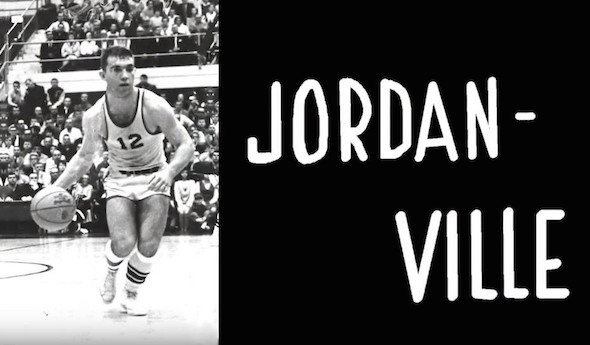
Film Fills In Picture of 'Fennville Flash'
By
Ron Pesch
MHSAA historian
December 28, 2017
We’ve been here before, but not in this way.
The last time was for a retrospective, covering one of the most impressive and awe-inspiring prep careers in Michigan high school history. That time was in print, and included a handful of still images that tried to illustrate the unbelievable.
But this time, the story is in documentary form. It’s woven together from grainy, scratched, faded silent film, a format of capturing memories familiar to thousands of people from generations past, as well as a series of modern-day high-resolution interviews.
Here, the basketball life of the athlete known as the “Fennville Flash” delivers on many levels. Yes, there is a Richie Jordan.
JordanVille, a documentary by John Mooy & Anne Colton, recalls a time when legend spread via word of mouth, newsprint and AM radio.
While it’s hard to comprehend for many today, the exploits of our athletic heroes were formed by “poets in the press box” who sat with pencil and paper, a typewriter, a microphone or a telephone, and described to their audience what they witnessed. On the receiving end, readers and listeners conjured up visualizations based on the facts, phrases and superlatives designed to create an image.
“Traveling left to right on your radio dial” helped listeners feel they were a member of the crowd, seated in the stands, in on the action and a witness to the mayhem. “Packed to the rafters,” reminded fans the importance of what was happening. An exciting game, presented by those with skill, created an event you longed to see. If a broadcast couldn’t be picked up on a transistor or tube radio, the final result might not be known, at the earliest, until the following day’s newspaper arrived.
I’ve told Jordan’s story via the MHSAA before; how he latched on to athletic training, weights and repetition to mold himself into a well-rounded athlete, able to leap to heights unexpected for a kid with a 5-foot-7 frame. The tales of his unfathomable accomplishments slowly leaked beyond the city limits of Fennville into Kalamazoo and greater Southwestern Michigan, then to Detroit. When Detroit Free Press writer Hal Schram relayed Jordan’s feats, the secret traveled across the state and beyond its drawn borders.
From there the legend of Jordan’s accomplishments grew. In Fennville, as in many small towns across the country, the city shut down when a game was played. The Jordan story was so enticing that thousands would travel vast distances to see him play with their own eyes. Today, his single season scoring average of 44.4 points per game during the 1964-65 campaign still remains the top mark in the MHSAA record book.
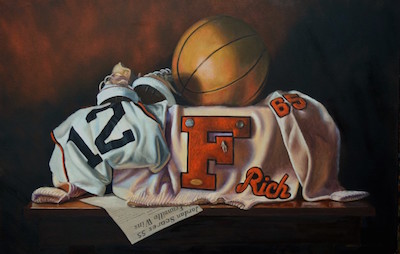 JordanVille runs just shy of a half hour. Contained within is insight into the athlete that is challenging to relay in print form. Thanks to access to home movies and a series of interviews with Jordan, former teammates, past opponents and his high school coach, the determination, dedication and drive of a kid who wouldn’t let physical size be a deterrent from achievement radiates from the screen. On display is small town America at its finest, and perspective formed over 50+ years.
JordanVille runs just shy of a half hour. Contained within is insight into the athlete that is challenging to relay in print form. Thanks to access to home movies and a series of interviews with Jordan, former teammates, past opponents and his high school coach, the determination, dedication and drive of a kid who wouldn’t let physical size be a deterrent from achievement radiates from the screen. On display is small town America at its finest, and perspective formed over 50+ years.
For Mooy, it completes a filmmaking journey started six years ago. But the story of Jordan, in his eyes, date back to his school days. Mooy first heard about Jordan as a 7th-grader from a math teacher. A second-team all-St. Joseph Valley League selection, Mooy played at Marcellus High School and scrimmaged against Jordan and the Fennville Blackhawks.
He couldn’t believe his eyes.
“Everyone wanted to see this kid play,” said Mooy in 2011. “He was the first high school player I saw sign an autograph.
Today, with the interviews complete, and the film ready for viewing, Mooy sees more than just a sports story:
“With the benefit of years now passed, I look at the Rich Jordan story with a new respect. JordanVille created a place that was welcoming no matter who you were, or what color your skin happened to be. It was the 1960s. Rich was growing up Jewish, the Civil Rights Movement was in full swing, and the Vietnam War was on everyone's mind. And in Fennville, Michigan, from 1961 to 1965, the Jordan high school years, there were lessons beyond sports being learned by everyone that would last a lifetime. The Jordan household, under the guidance of (his parents) Tuffy and Sylvia Jordan, is where the story begins."
The film speaks of a time that has departed. Competition for our attention was less focused; phones hung on walls or sat on tabletops, communities were tighter, the training table featured peanut butter and chocolate milk instead of protein powder. A city could easily be renamed for a day.
The film also reminds us that those days were far from perfect.
If all goes as planned, the public will see the finished product come the flip of the calendar. In West Michigan, JordanVille is scheduled to show on New Year’s Day at 6 p.m. on WGVU, and will repeat on WGVU-Life at 7:30 p.m., Friday, Jan. 5.
Seek it out, and spread the word, just like in days of old.
 Ron Pesch has taken an active role in researching the history of MHSAA events since 1985 and began writing for MHSAA Finals programs in 1986, adding additional features and "flashbacks" in 1992. He inherited the title of MHSAA historian from the late Dick Kishpaugh following the 1993-94 school year, and resides in Muskegon. Contact him at [email protected] with ideas for historical articles.
Ron Pesch has taken an active role in researching the history of MHSAA events since 1985 and began writing for MHSAA Finals programs in 1986, adding additional features and "flashbacks" in 1992. He inherited the title of MHSAA historian from the late Dick Kishpaugh following the 1993-94 school year, and resides in Muskegon. Contact him at [email protected] with ideas for historical articles.
PHOTOS: (Top) Richie Jordan runs Fennville's offense during his thrilling high school career in the 1960s. (Middle) Jordan memorabilia, as captured by Bill Williams.
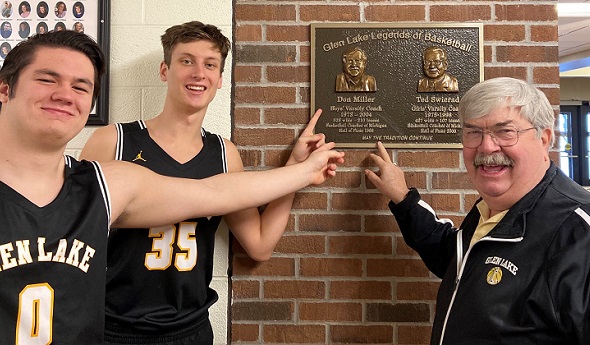
Miller's Mentoring Spans Into 7th Decade
January 29, 2020
By Mike Spencer
Special for Second Half
MAPLE CITY – With the dawn this winter of the 2020s, Don Miller is coaching high school basketball in a seventh decade.
 That’s rarefied air in Michigan High School Athletic Association circles, but it’s an atmosphere the 73-year-old longtime Maple City Glen Lake basketball coach has enjoyed and plans to continue as long as his health, family and Laker nation lets him.
That’s rarefied air in Michigan High School Athletic Association circles, but it’s an atmosphere the 73-year-old longtime Maple City Glen Lake basketball coach has enjoyed and plans to continue as long as his health, family and Laker nation lets him.
“I have a passion for the bouncing of balls in a gym,” said Miller, who made his coaching debut at Howell in 1969 but then spent five decades guiding the Lakers’ ship. “The worst headache I may have disappears with that sound as I walk into a gym. The blood pressure goes down and the pleasure goes up – practices or games.”
Miller, admittedly the last man on his varsity basketball team at Southfield High during his playing days, coached a lot of good teams and players at Glen Lake during his varsity tenure (1973-2004) when he posted a 523-210 record.
“I didn’t have a lot of basketball skill, but I was a basketball junkie who got the bug to coach and I got better over the years,” Miller said. “I never scored a basket over the years, but I had a lot of players who made me look good. The kids loved the game and had the passion, and we had a spinning wheel of success breeding success.”
A Michigan State University grad, Miller enjoyed watching the Spartans practice after classes, although he never could have forecasted he’d become a Basketball Coaches Association of Michigan (BCAM) Hall of Famer in 1998 or enjoy decades of leading drills.
“Basketball is all about great chemistry, and being with young people sharing a game we love is just wonderful,” Miller said. “And to be able to do it this long is a gift, not a job. I am truly blessed to be in a gym for three hours a day.”
Today, there’s just a handful of active MHSAA coaches with Miller’s experience. Ironically, one of them is Beaverton’s Roy Johnston. Miller was an assistant of Johnston’s back in the early 1970s.
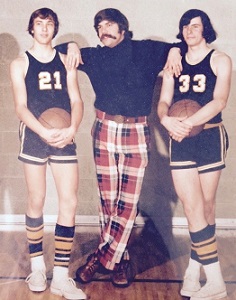 “I’m shocked to see Don still coaching,” said Cody Inglis, a former Suttons Bay athletic director/coach who worked Miller’s camps for a decade and went on to serve as athletic director at Traverse City Central and currently as an MHSAA assistant director. “But it shows that if there’s something you are good at, and something that you are passionate about, that you are never too old to do it.
“I’m shocked to see Don still coaching,” said Cody Inglis, a former Suttons Bay athletic director/coach who worked Miller’s camps for a decade and went on to serve as athletic director at Traverse City Central and currently as an MHSAA assistant director. “But it shows that if there’s something you are good at, and something that you are passionate about, that you are never too old to do it.
“Don’s been a wonderful role model for coaching, perseverance and doing it the right way.”
Former player Todd Ciolek, who also has had a child play for Miller, concurred.
“It’s pretty amazing,” Ciolek said of Miller’s tenure. “But when you have a love for something, it makes it easy to do. For him, he’s got a love for this and I think it comes naturally.”
Miller guided the Lakers boys team to the Class D title in 1977 and runner-up finish in 1996. His teams also reached the MHSAA Semifinals twice. His teams won six Regionals, 16 Districts and 14 conference titles.
He stepped down as Glen Lake’s main man after the 2004 season due to health issues, needing a pacemaker and a stent. He continued running his summer basketball camps and became a volunteer assistant coach for former all-state player Todd Hazelton in 2007.
When Rich Ruelas became head coach in 2015, he asked Miller to be his junior varsity coach. Miller did that for three seasons and is now an assistant varsity coach.
“I was reborn!” Miller said. “I don’t eat and sleep basketball like I used to, but I love my three hours each day with these young men who share this common passion. It’s been a lifesaver.
“My role is advisor and listener,” he added. “But watching Rich, he’s me 30 years ago. I love feeding off his intensity.”
“I truly enjoy having Coach Miller as part of the program that he helped build,” Ruelas said. “There is nothing he hasn't gone through as a coach, and I have relied on him for advice over the past five years.
“He just knows the game so well and has made such an impact on the lives of his former players and campers with his ability to teach life lessons through basketball. We are lucky to have a Hall of Fame coach as part of our program, and I don't take it for granted.”
Ruelas and Miller, a retired educator, not only get together three hours in a gym daily, they routinely have “Mornings with Miller,” on the phone as Ruelas makes his 30-minute commute to school.
Ruelas said Miller has already given him some memorable moments – the unbeaten junior varsity team in 2018 that Miller coached, assistance with the Lakers’ 2018 Finals run (Glen Lake finished Class C runner-up) and an opportunity to meet MSU coach Tom Izzo.
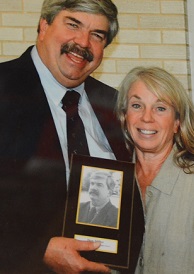 “What sticks out to me most is that we cannot go anywhere in the state without Don running into a former camper or player,” Ruelas said. “He has made such a lasting impact on so many, and it is evident in his relationships with his former players over the past seven decades.
“What sticks out to me most is that we cannot go anywhere in the state without Don running into a former camper or player,” Ruelas said. “He has made such a lasting impact on so many, and it is evident in his relationships with his former players over the past seven decades.
“I'm not sure how long he will continue to be on the bench with me, but I know he still has a lot of fire in his belly. As long as he has permission from his wife and is able, I expect him to be there.”
One of Miller’s trademarks is teaching life lessons first and basketball second.
“Don was a unique coach,” Ciolek said. “He wasn’t a coach of basketball first; he was a coach of ethics and morals and basketball came second.
“Most coaches start with some technique, but he started with the word respect and then engrained in us that there was more beyond basketball. He instilled a set of values in us that ultimately led to victories.”
While Miller has had decades of success, some of the losses were devastating.
“You remember the losses more than the wins, and three last-second losses are forever etched in my brain,” said Miller noting a 1978 loss to Mio and Jay Smith in the Regional Final at Gaylord, a buzzer-beating in 1988 by eventual Class D champ Northport and the 1996 Semifinal loss to Wyoming Tri-unity Christian. “The pain and tears and disappointment of these three were great memories. But losses are part of the game and the boys, now men on those teams, have made me very proud ever since.”
Miller said he’s seen a lot of things change for the better since he started coaching. Players are starting younger and getting better coaching earlier, and that has led to improved talent and team play. There are also nicer gyms and uniforms, and Miller loves the idea of boys sharing the spotlight with girls programs.
His disdains, however, are that larger schools today have kids who tend to specialize in one sport earlier, and the crowd of negative parents is growing.
“Our kids play several sports, and I feel it makes them better,” Miller said. “Playing for other coaches in other sports increases competitiveness and team play. You learn to be a different role player, and that carries over into life. “
Miller said credit for his decades of success goes to his supportive wife, Sandy, and the blind luck of having Paul Christiansen as his first junior varsity coach.
“Paul was my organizer, critic, conscience and cohort for three decades,” Miller said. “He is a Hall of Fame track coach but the real wind beneath my wings. None of this happens without Paul.”
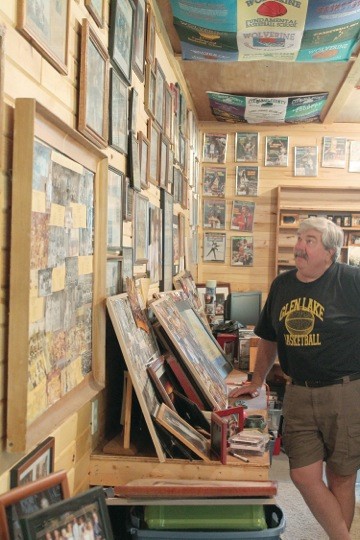 Both Miller and Christiansen were honored by BCAM in 1998, with Miller going into the HOF and Christiansen going into the Hall of Honor.
Both Miller and Christiansen were honored by BCAM in 1998, with Miller going into the HOF and Christiansen going into the Hall of Honor.
Miller also credits a number of coaching mentors including the late Larry Glass, a former Big Ten men’s coach and girls basketball coach at Leland, and great players and coaches he recruited to help at his summer camps in Wolverine and Glen Lake.
While Miller savors the friendships with other coaches, he’ll forever cherish his former players, who reciprocated their love by building him a man cave and basketball museum after he retired in 2004 and show up for weekly games of basketball at the Glen Arbor Town Hall – a 40-year-old tradition – with fellowship afterward.
“They call, email and treat me to meals out which really is too bad for my figure but great for my ego and friendships,” Miller admitted. “I love my boys (now men) and for that, I am truly the luckiest.”
“I was fortunate enough to be coached by Don when he was just starting out at Howell,” said Tom Murray, former Bay City John Glenn and Standish-Sterling Central coach. “He changed my life and many of my classmate’s lives.
“Don’s touched so many lives, it’s incredible. He instilled a lifelong love of basketball in me. He is a fantastic coach and man.”
Mike Spencer is a former MHSAA referee and sportswriter for the Bay City Times, Midland Daily News and Leelanau Enterprise and freelancer for both the Enterprise and the Traverse City Record Eagle.
Seven Decades of Miller Highlights
1960s – Last man on the Southfield High team. Watching MSU practice after class without a clue that he would coach someday. Getting hired in 1969 as the freshman coach at Howell because no else wanted the job and coaching Morey Ray, his first great player.
1970s – Coaching the 1977 Class D championship season and the slow evolution over the years of the front line of seniors Dave Prentice, Geof Kotila and Rick Baillergeon, who started for three years. Being down three points, without the ball and 30 seconds to go, and winning the Final by two on a shot with one second left against the No. 1-ranked team in the state, Detroit East Catholic, 70-68.
1980s – Keeping the ball rolling and seeing four of those starters – from the 1977 and 1978 teams – become captains of a college team. Reaching the quarters in 1980, the semis in 1981, 1984 and 1985. Standouts included Bob Sutherland (’80), Bill Zolman and Kevin Crinion (’81), Ron Winowiecki and Dan Witkowski (’84), and Mike Crinion and Ross Hazelton (’85). Beating No. 1 Bear Lake at Traverse City Central in front of 2,800 fans – “Loudest gym. Teamwork over talent and Mike Crinion was amazing.”
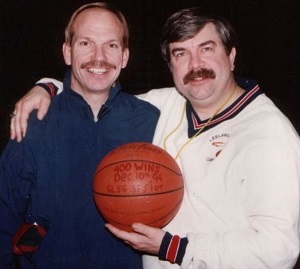 1990s – Keeping ball rolling as elementary kids became high school stars. Reaching the quarters in 1991 and 1995 and semis in 1996. Standouts included Micah Deegan and Bryan Fosmore (’91), Todd Ciolek and Max Miller (’95), and Jamie Mazurek and Greg Aylsworth (‘96). Semifinal upset of reigning Class D champ Detroit Holy Redeemer, 81-66.
1990s – Keeping ball rolling as elementary kids became high school stars. Reaching the quarters in 1991 and 1995 and semis in 1996. Standouts included Micah Deegan and Bryan Fosmore (’91), Todd Ciolek and Max Miller (’95), and Jamie Mazurek and Greg Aylsworth (‘96). Semifinal upset of reigning Class D champ Detroit Holy Redeemer, 81-66.
2000s – Retired in 2004, but with recent adoring memories of 2002 league and District championship team led by Chris Milliron and Steve Walker. Team showed great improvement in ability and attitude, avenging losses to Suttons Bay and Traverse City St. Francis with 24-point victories.
2010s – Returned in 2015 as assistant coach to Rich Ruelas and coached the boys junior varsity to 55-5 record over his first two seasons with three sophomores and a freshman on the varsity. Posted two 20-0 seasons.
2020 – Still coaching as an assistant.
PHOTOS: (Top) Glen Lake assistant boys basketball coach Don Miller, with captains Ben Kroll (left) and Reece Hazelton, point to the plaque declaring his legendary status in the program. (2) Miller confers with a pair of players during the 1977 Class D championship season. (3) Miller and his wife Sandy. (4) Miller stands among the many mementos decorating his basketball museum built by former players. (5) Miller stands with longtime assistant Paul Christiansen, holding a ball commemorating Miller’s 400th coaching win in 1994. (Photos courtesy of Don Miller and the Leelanau Enterprise.)

